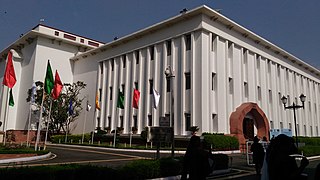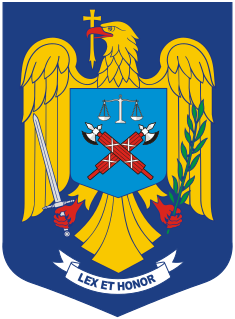
The World Factbook, also known as the CIA World Factbook, is a reference resource produced by the Central Intelligence Agency (CIA) with almanac-style information about the countries of the world. The official print version is available from the Government Printing Office. Other companies—such as Skyhorse Publishing—also print a paper edition. The Factbook is available in the form of a website that is partially updated every week. It is also available for download for use off-line. It provides a two- to three-page summary of the demographics, geography, communications, government, economy, and military of each of 267 international entities including U.S.-recognized countries, dependencies, and other areas in the world.

The War Office was a Department of the British Government responsible for the administration of the British Army between 1857 and 1964, when its functions were transferred to the Ministry of Defence. It was equivalent to the Admiralty, responsible for the Royal Navy, and the Air Ministry, which oversaw the Royal Air Force. The name "War Office" is also given to the former home of the department, the War Office building, located at the junction of Horse Guards Avenue and Whitehall in central London.

The Welsh Government is the devolved government of Wales. It was established by the Government of Wales Act 1998, which created a devolved administration for Wales in line with the result of the 1997 referendum on devolution. The Welsh Government formally separated from the Assembly in 2007 following the passage of the Government of Wales Act 2006. The government consists of ministers, who attend cabinet meetings, and deputy ministers who do not, and also of a counsel general. It is led by the first minister, usually the leader of the largest party in the National Assembly, who selects ministers and deputy ministers with the approval of the assembly. The government is responsible for tabling policy in devolved areas for consideration by the assembly and implementing policy that has been approved by it.

The United States Naval Criminal Investigative Service (NCIS) is the primary law enforcement agency of the U.S. Department of the Navy. Its primary function is to investigate criminal activities involving the U.S. Navy and U.S. Marine Corps, though its broad mandate includes national security, counterintelligence, counter-terrorism, cyber warfare, and the protection of U.S. naval assets worldwide. NCIS is the successor organization to the former Naval Investigative Service (NIS), which was established by the Office of Naval Intelligence after the Second World War.

Telugu cinema, also known by its sobriquet Tollywood, is the segment of Indian cinema dedicated to the production of motion pictures in the Telugu language, based in Film Nagar, a neighborhood of Hyderabad, Telangana. Since 1909, film maker Raghupathi Venkaiah was involved in producing short films and travelling to different regions in Asia to promote film work. In 1921, he produced the first Telugu silent film, Bhishma Pratigna. He is cited as the father of Telugu cinema. Tollywood is one of the largest film industries in India along with Bollywood

The National Film Awards is the most prominent film award ceremonies in India. Established in 1954, it has been administered, along with the International Film Festival of India and the Indian Panorama, by the Indian government's Directorate of Film Festivals since 1973.
The National Film Award for Best Feature Film in Tamil is one of the National Film Awards presented annually by the Directorate of Film Festivals, the organisation set up by Ministry of Information and Broadcasting, India. It is one of several awards presented for feature films and awarded with Rajat Kamal.
The National Film Award for Best Actor, officially known as the Rajat Kamal Award for the Best Actor, is an honour presented annually at the National Film Awards of India instituted since 1967 to actors who have delivered the best performance in a leading role within the Indian film industry. Called the "State Awards for Films" when established in 1954, the National Film Awards ceremony is older than the Directorate of Film Festivals. The State Awards instituted the individual award in 1968 as the "Bharat Award for the Best Actor"; in 1975, it was renamed as the "Rajat Kamal Award for the Best Actor". Throughout the past 45 years, accounting for ties and repeat winners, the Government of India has presented a total of 52 "Best Actor" awards to 40 actors. Until 1974, winners of the National Film Award received a figurine and certificate; since 1975, they have been awarded with a "Rajat Kamal", certificate and a cash prize.
The National Film Award for Best Actress is an honour presented annually at the National Film Awards of India since 1968 to an actress for the best performance in a leading role within the Indian film industry. The National Film Awards were called the "State Awards for Films" when established in 1954. The State Awards instituted the "Best Actress" category in 1968 as the "Urvashi Award for the Best Actress"; in 1975, the "Urvashi Award" was renamed as the "Rajat Kamal Award for the Best Actress". Throughout the years, accounting for ties and repeat winners, the Government of India has presented a total of 52 Best Actress awards to 41 different actresses.
The National Film Award for Best Feature Film in Hindi is one of the National Film Awards presented annually by the Directorate of Film Festivals, the organisation set up by Ministry of Information and Broadcasting, India. It is one of several awards presented for feature films and awarded with Rajat Kamal.
The National Film Award for Best Feature Film in Telugu is one of the National Film Awards presented annually by the Directorate of Film Festivals, the organisation set up by Ministry of Information and Broadcasting, India. It is one of several awards presented for feature films and awarded with Rajat Kamal.
A town panchayat or panchayat is a small town of approximately 20,000 to 25,000 inhabitants. It is formed under the panchayati raj administrative system. In census data, the abbreviation T.P. is used to indicate a "town panchayat". Tamil Nadu was the first state to introduce the panchayat town as an intermediate step between rural villages and urban local bodies (ULB).

The Directorate of Film Festivals in India is an organisation that initiates and presents the International Film Festival of India, the National Film Awards and the Indian Panorama. Although the Directorate helps appoint members of the jury panels each year, it has no input on which films are selected for consideration and which films ultimately win awards at the various functions it initiates.
The following is a list of winners of the National Film Award for Best Male Playback singer. The award was first granted to Mahendra Kapoor in the year 1967. The singer with the most awards in this category is K. J. Yesudas with eight wins for three different languages, followed by S. P. Balasubrahmanyam who won six times for four different languages; Hindi, Kannada, Tamil and Telugu. Shankar Mahadevan and Udit Narayan follow next winning three awards each. The singers Manna Dey, Hemanta Kumar Mukhopadhyay, M. G. Sreekumar, Hariharan have bagged this award twice.
The National Film Award for Best Female Playback Singer is an honour presented annually at the National Film Awards of India since 1968 to a female playback singer for the best renditions of songs from soundtracks within the Indian film industry. Throughout the years, accounting for ties and repeat winners, the Government of India has presented a total of 46 Best Female Playback Singer awards to 24 different female playback singers. Until 1974, winners of the National Film Award received a commemorative plaque and certificate; since 1975, they have been awarded with a "Rajat Kamal", certificate and a cash prize that amounted to ₹50,000 (US$700) in 2013. The first recipient was P. Susheela, who was honoured at the 16th National Film Award (1968) for her renditions from the Tamil film Uyarntha Manithan. The singer who won the most number of Rajat Kamal awards is K. S. Chithra with six wins, followed by P. Susheela with five. As of 2013, two singers—S. Janaki and Shreya Ghoshal—have won the award four times, and two—Lata Mangeshkar and Vani Jairam—have won it thrice. The award has been won twice by Asha Bhosle, Alka Yagnik and Arati Ankalikar-Tikekar. S. Janaki, K. S. Chithra, and Shreya Ghoshal have won the award for their renditions in three different languages. Shreya Ghoshal is the sole recipient of the award for two different songs in the same year in two different languages. Uthara Unnikrishnan is the youngest winner, picking up the award at the age of 10 for the rendition of a song from the Tamil film Saivam (2014). No award was given for this category in 1973.
The National Film Award for Best Feature Film in Marathi is one of the National Film Awards presented annually by the Directorate of Film Festivals, the organisation set up by Ministry of Information and Broadcasting, India. It is one of several awards presented for feature films and awarded with Rajat Kamal.

The Romanian Police is the national police force and main civil law enforcement agency in Romania. It is subordinated to the Ministry of Administration and Interior and it is led by a General Inspector with the rank of Secretary of State.

The Federal Police, formerly known as the Policía Federal Preventiva, is the Mexican national police force. It is under the authority of the Department for Home Affairs. They are sometimes referred to by the slang term "Federales" or “Mexican feds” by some U.S. agents and media. Typically, agents of the Federal Police are heavily armed and wear dark blue, black, or gray combat fatigues.

The Directorate of Enforcement is a law enforcement agency and economic intelligence agency responsible for enforcing economic laws and fighting economic crime in India. It is part of the Department of Revenue, Ministry of Finance, Government Of India. It is composed of officers from the Indian Revenue Service, Indian Police Service and the Indian Administrative Service. The origin of this Directorate goes back to 1 May 1956, when an ‘Enforcement Unit’ was formed, in Department of Economic Affairs, for handling Exchange Control Laws violations under Foreign Exchange Regulation Act, 1947. In the year 1957, this Unit was renamed as ‘Enforcement Directorate’.

Tamil Nadu is one of the most literate states in India. The state's literacy rate is 80.33% in 2011, which is above the national average. A survey conducted by the Industry body Assocham ranks Tamil Nadu top among Indian states with about 100% Gross Enrollment Ratio (GER) in primary and upper primary education.












